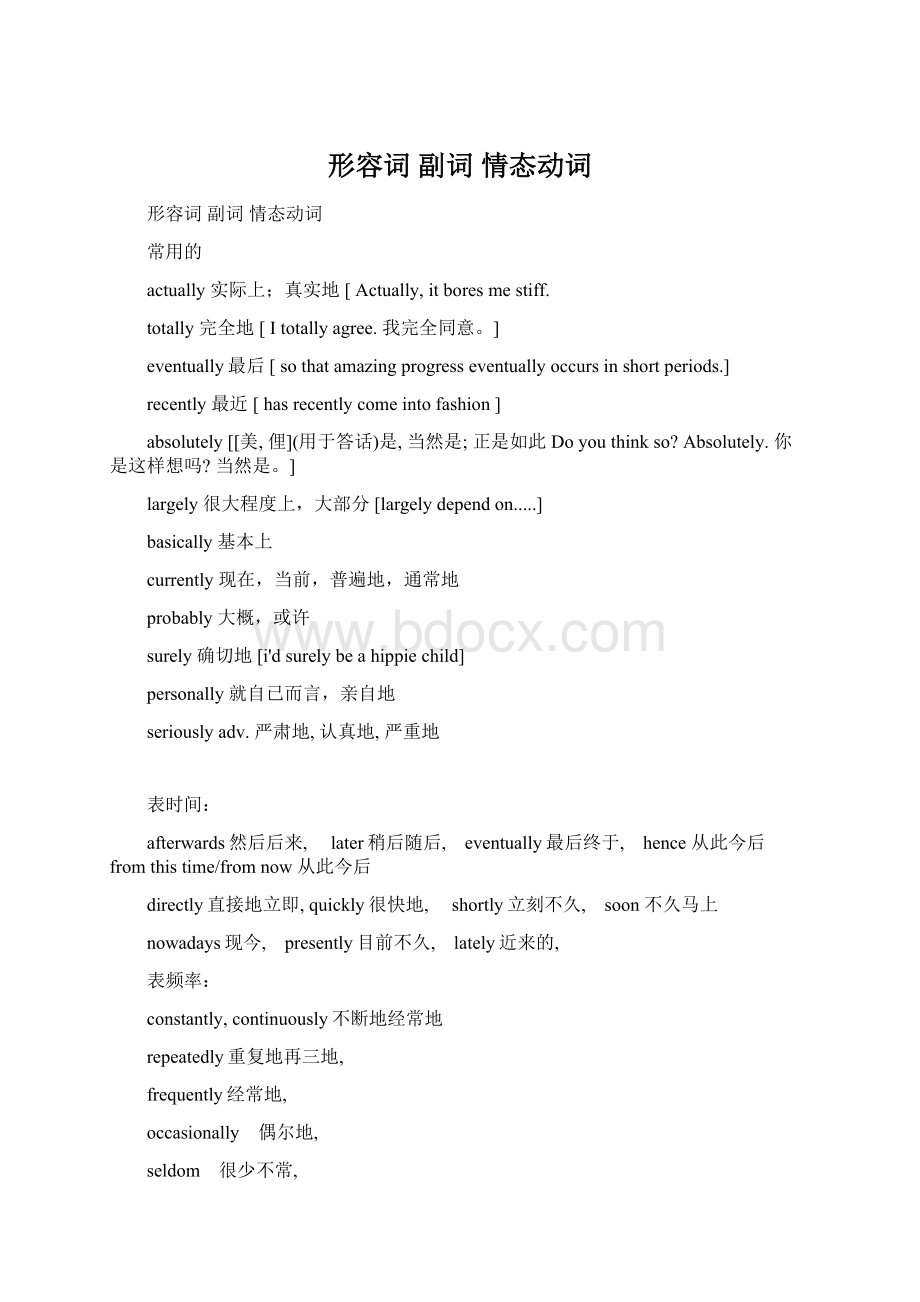形容词 副词 情态动词.docx
《形容词 副词 情态动词.docx》由会员分享,可在线阅读,更多相关《形容词 副词 情态动词.docx(13页珍藏版)》请在冰豆网上搜索。

形容词副词情态动词
形容词副词情态动词
常用的
actually实际上;真实地[Actually,itboresmestiff.
totally完全地[Itotallyagree.我完全同意。
]
eventually最后[sothatamazingprogresseventuallyoccursinshortperiods.]
recently最近[hasrecentlycomeintofashion]
absolutely[[美,俚](用于答话)是,当然是;正是如此Doyouthinkso?
Absolutely.你是这样想吗?
当然是。
]
largely很大程度上,大部分[largelydependon.....]
basically基本上
currently现在,当前,普遍地,通常地
probably大概,或许
surely确切地[i'dsurelybeahippiechild]
personally就自已而言,亲自地
seriouslyadv.严肃地,认真地,严重地
表时间:
afterwards然后后来, later稍后随后, eventually最后终于, hence从此今后 fromthistime/fromnow从此今后
directly直接地立即,quickly很快地, shortly立刻不久, soon不久马上
nowadays现今, presently目前不久, lately近来的,
表频率:
constantly,continuously不断地经常地
repeatedly重复地再三地,
frequently经常地,
occasionally 偶尔地,
seldom 很少不常,
rarely 很少地,
yearly,monthly,weekly
表逻辑:
accordingly相应地 Inaccordance;correspondingly.
likewise 同样地照样,*Thefoodwasexcellent,(and)likewisethewine.菜好极了,酒也是. *I'mgoingtobedandyouwouldbewelladvisedtodolikewise.我要睡觉了,你最好也睡吧.
accordingly因此,
consequently 因此,
hence 因此,thereby 因此由此
merely 只不过仅仅 merelyafleshwound.仅仅是皮肉伤
furthermore,moreover,besides
nevertheless,nonetheless;however 仍然
*Heisoftenrudetome,butIlikehimnevertheless.他时常对我粗鲁无礼,但我还很喜欢他.
Inspiteofsth; 尽管,
regardless无论如何 continuestoworkregardless.不顾后果地继续工作
表语气:
actually,definitely,undoubtedly,absolutely
normally,generally,
wholly 完全地彻底地
likely 或许很可能,
virtually 事实上实质上,
naturally,
necessarily 必要地,
similarly 类似地同样地
simply 简单地
conversely相反地颠倒地
respectively逐个地分别的,
individually 个别地 *speaktoeachmemberofagroupindividually对组里每个人逐个地说.
separately 个别地单独地
roughly 概略地大致地,
somewhat 稍微有点
表程度:
approximately,nearly,
largely,mainly,mostly,primarily,
increasingly,,partly,
scarcely,
表方位(通常也都可作形容词,或部分介词):
aside往旁边 pullthecurtainaside把帘子拉向一边
alongside 旁边 stoodwithabodyguardalongside,
backwards/backward都可作副词steppedbackwards向后踏步 abackwardview(作形容词时不能用backwards)
beneath 在…之下 *Theyfoundthebodyburiedbeneathapileofleaves.
downwards 向下 downdard形容词,
forth *fromthatdayforth从那天起,
forward 向前地 *settheclockforward.把表向前拨
inwards 向内地, outwards 向外地
nearby 附近的,
northeast 东北地,
northwest 西北的,
southeast 东南地
southwest 西南地
opposite 在对面的Theysatoppositeatthetable.
outdoors 在户外在野外
overhead 在头顶 lookoverhead向上看
overseas 海外
sideways 向侧面地,
underground 地下的
underneath 在下面 *theunderneathofacar
慢慢地:
slowly
快地:
quickly,swiftly
快乐地:
happily
适当地:
properly,appropriately
传统地:
traditionally
便捷地:
conveniently
有希望地:
hopefully
严格地:
strictly
凶猛地:
ferociously
·······················································
1)historic:
famousinhistory,历史上著名的associatedwithpasttimes与过去时代有关的
a~event/speech/spot
historical:
belongtohistory历史上的
a~people/novel/play/film/painting
~trend
2)electric:
workedby,changedwith,producingelectricity用电的,带电的,有电的
~current/cable
electrical:
relatingtoelectricity,anideaofalesscloseconnectionwith
electricity
~engineering/apparatus
3)economic:
ofeconomics
~policy/geography/crisis/crops
economical:
carefulinthespendingofmoneyandtime,notwaste经济的,节俭的
an~housewife/store
4)industrial:
ofindustries工业的
the~revolution/products/system
industrious:
hard-working,diligent
~people
5)considerable:
greatmuch相当多(大)的
a~income/distance
considerate:
thoughtful体谅的,体贴的周到的
Sheis~toothers.
6)sensible:
reasonable,havinggoodsense实用的,明知的
a~woman/idea/豁达的妇女/明知的观点
~clothes实用的衣服
sensitive:
quicktoreceiveimpression敏感的
a~skin
~paper感光纸
7)continual:
goingonallthetimewithoutstoppingorwithonlyshortbreaks,
stopandgorepeatedly,连续的,断断续续的
~rain/noise
continuous:
goingonwithoutabreak,anuninterruptedflow连续不断的
~fight/work
8)intense:
highindegree强烈的,剧烈的,高度的
~heat炽热/pain
an~lady热情的女子
intensive:
deepandthorough精深的,集中的
~reading/study彻底研究/agriculture密集农业
9)respectable:
deservingrespect,值得尊敬的,有名望的
a~man/profession
respectful:
showingrespect尊敬人的,有礼貌的,
Heisalways~totheelders.
respective:
belongstoeachofthese分别的,各自的
Theysatontheir~chairs.
10)imaginable:
thatcanbeimagined可象想的
~difficulties
imaginary:
existingonlyinthemind,unreal想象中的,不真实的
~figure
imaginative:
of,having,usingimagination有想象力的,运用想象力的
a~writer
11)intelligent:
having,showingintelligence,clever有才智的,聪明的
an~lookinggirl~answer
intelligible:
cleartomind,thatcanbeeasilyunderstood.易了解的,易领悟的
an~speech/explanation
intellectual:
possessingagreatdealofknowledge知识的,智力的
12)contemptible:
deservingcontempt可卑的
a~lie
contemptuous:
showingcontempt表示轻视的
a~look
13)credible:
thatcanbebelieved可信的,可靠的
a~witness
credulous:
tooreadytobelievethings.轻易相信的,易上当的
Healwayscheats~people.
creditable:
thatbringscredit.可称赞的
a~record/deed/effort
14)alternate:
changingbyturns轮流的,交替的
alternative:
givingachoicebetweentwothings选择的,两者选一的
15)comparable可比较的,有类似之处的
comparative比较而言的,相当的
ThereisnoscenerycomparabletothatoftheWestlake.
Helivedincomparativecomfortrecently.
16)politic精明的
political政治的
17)beneficial有益的
beneficent多多行善的
18)official官方的
officious多管闲事的
19)potent强有力的
potential潜在的,可能的
20)confident有信心的,自信的
confidential机密的
21)negligent忽视的,粗心大意的
negligible可忽视的
22)momentary瞬时的,短时的
momentous重大的
23)memorable值得记忆的,不能忘却的
memorial纪念的
24)social社会的
sociable善社交的
25)childish幼稚的
childlike孩子般的
26)distinct:
clear明显的,清晰的
distinctive:
characteristic独特的,有区别的
27)classic一流的
classical古典的
28)comprehensible可理解的
comprehensive全面的,综合的
29)disinterested公平的
uninterested冷淡的
30)earthly人间的,尘世的
earthy泥土似的
31)effective有效的
efficient有效率的
effectual奏效的
32)exceptionable反对的
exceptional非凡的
33)fatal致命的
fateful决定性的
34)fleshly肉体的
fleshy肥胖的
35)homely家常的
homelike象家的
36)im(un)practical不切合实际的
impracticable无法使用的
37)ingenious有独创性的
ingenuous直率的,天真的
38)manly男人气派的
male男的
masculine男性的
39)movable可移动的,变动的
mobile可动的,活动地
40)mysterious神秘的
mystical奥妙的
41)notable著名的(指事)
noted著名的(指人)
42)practical实际的
practicable可行的,通行的
43)regretful遗憾的(指人)
regrettable遗憾的(指事)
44)seasonable及时的
seasonal季节的
45)spiritual精神的
spirituous酒精的
46)tortuous弯曲的
torturous受刑的
47)transitory短时间的(指事)
transient瞬时的(指人)
48)elementary基本的
elemental自然的
49)healthy健康的
healthful有易于健康的
50)likely可能的
likable可爱的
51)desirable合意的
desirous渴望的
52)clean干净的
cleanly有干净习惯的Arecatscleanlyanimals?
53)kind慈善地
kindly友好的,亲切的
54)temporal一时的,暂时的,世俗的
temporary暂时的,临时的
1)can和could的用法
1.表示能力或客观可能性,还可以表示请求和允许。
如:
Canyoufinishthisworktonight?
Mancannotlivewithoutair.—CanIgonow?
—Yes,youcan.
注意:
①could也可表示请求,预期委婉,主要用于疑问句,不可用于肯定句,答语应用can(即could不能用于现在时态的简略答语中)。
如:
CouldIcometoseeyoutomorrow?
Yes,youcan.(否定答语可用No,I'mafraidnot.)②can表示能力时,还可用beableto代替。
如:
I'llnotbeabletocomethisafternoon.
2.表示惊异、怀疑、不相信的态度。
(主要用在否定句、疑问句或惊叹句中)Canthisbetrue?
Howcanyoubesocareless!
Thiscannotbedonebyhim.
3.can(could)+have+过去分词”的疑问或否定形式表示对过去发生的行为怀疑或不肯定。
如:
Hecannothavebeentothattown.Canhehavegotthebook?
2)may和might的用法
1.表示许可。
表示请求、允许时,might比many的语气更委婉一些,否定回答时要用mustn't表示“不可以”、“禁止”、“阻止”之意。
如:
Youmaydrivethecar.—MightIuseyourpen?
—No,youmustn't.用MayI...征询对方许可在文体上比较正式,在口气上比较客气。
在日常口语中,用CanI...征询对方意见在现代口语中更为常见。
2.用于祈使句中表示祝愿。
如:
Mayyousucceed!
3.表示推测、可能(疑问句不能用于此意)。
Hemaybeverybusynow.4.“may(might)+have+过去分词”表示对过去发生的行为的推测。
如:
Hemaynothavefinishedthework.
3)must和haveto的用法
1.表示必须、必要。
如:
Youmustcomeintime.回答must引出的问句时,如果是否定的回答,不能用mustn't,而要用needn't或don'thaveto。
—Mustwehandinourexercisebookstoday?
—Yes,youmust.(No,youdon’thaveto.)
2.mustbe+表语”的结构表示推测,它的否定或疑问式用can代替must。
Thismustbeyourpen.
3.must+have+过去分词”的结构常用在肯定句中,表示对过去发生的行为的推测。
它的否定或疑问式用can代替must。
HemusthavebeentoShanghai.
4.haveto的含义与must相似,两者往往可以互换使用,但haveto有各种形式,随have的变化而定。
must与haveto有下列几点不同:
①must表示的是说话人的主观看法,而haveto则往往强调客观需要。
如:
Theplayisnotinteresting.Ireallymustgonow.IhadtoworkwhenIwasyourage.②must一般只表现在,have则有更多的时态形式。
③二者的否定意义不大相同。
如:
Youmustn'tgo.你可不要去。
Youdon'thavetogo.你不必去。
④询问对方的意愿时应用must。
如:
MustIcleanalltheroom?
4)dare和need的用法
1.need表“需要”或“必须”,作情态动词时,仅用于否定句或疑问句中,在肯定句中一般用must,haveto,oughtto,或should代替。
如:
Youneedn’tcomesoearly.—NeedIfinishtheworktoday?
—Yes,youmust.注意:
needn't+不定式的完成式“表示本来不必做某事而实际上做了某事”。
如:
Youneedn'thavewaitedforme.
2.Dare作情态动词时,主要用于疑问句、否定句和条件从句中,一般不用在肯定句中。
如:
HowdareyousayI'munfair.Hedaren'tspeakEnglishbeforesuchacrowd,darehe?
3.Dare和need常用作实义动词,有时态、人称和数的变化,所不同的是,作实义动词时,在肯定句中,dare后面通常接带to的不定式,在否定和疑问句中,dare后面可接带to或不带to的不定式。
如:
Idaretoswimacrossthisriver.Hedoesnotdare(to)answer.Don'tyoudare(to)touchit!
Iwonderedhedare(to)saythat.Heneedstofinishitthisevening.
5)shall和should的用法
1.Shall用于第一人称,表示征求对方的意愿。
如:
Whatshallwedothisevening?
2.Shall用于第一、第三人称疑问句中,表示说话人征求对方的意见或向对方请示。
如:
Shallwebeginourlesson?
Whenshallhebeabletoleavethehospital?
3.Shall用于第二、第三人称,表示说话人给对方命令、警告、允诺或威胁。
如:
Youshallfailifyoudon'tworkharder.(警告)HeshallhavethebookwhenIfinishreading.(允诺)Heshallbepunished.(威胁)
4.Should表示劝告、建议、命令,其同义词是oughtto;在疑问句中,通常用should代替oughtto。
如:
Youshouldgotoclassrightaway.ShouldIopenthewindow?
Should的含义较多,用法较活,现介绍三种其特殊用法。
请看下面的句子:
①Ishouldthinkitwouldbebettertotryitagain.我倒是认为最好再试一试。
②Youaremistaken,Ishouldsay.依我看,你是搞错了。
③Ishouldadviseyounottodothat.我倒是劝你别这样做。
④ThisissomethingIshouldhavelikedtoaskyou.这是我本来想问你的。
从以上例句可以看出:
情态动词should用于第一人称时可以表示说话人的一种谦逊、客气、委婉的语气。
Should还可以用在if引导的条件从句,表示一件事听起来可能性很小,但也不是完全没有可能。
相当于